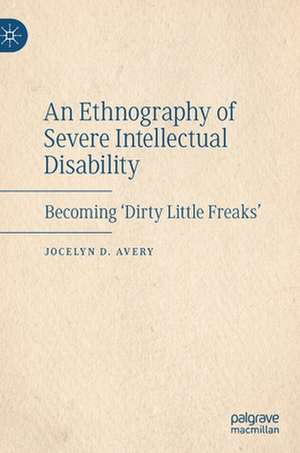An Ethnography of Severe Intellectual Disability: Becoming 'Dirty Little Freaks'
Autor Jocelyn D. Averyen Limba Engleză Hardback – 27 noi 2019
Preț: 530.54 lei
Preț vechi: 576.68 lei
-8% Nou
Puncte Express: 796
Preț estimativ în valută:
101.53€ • 105.40$ • 84.66£
101.53€ • 105.40$ • 84.66£
Carte tipărită la comandă
Livrare economică 18-24 martie
Preluare comenzi: 021 569.72.76
Specificații
ISBN-13: 9783030322083
ISBN-10: 3030322084
Pagini: 219
Ilustrații: XI, 219 p. 2 illus.
Dimensiuni: 148 x 210 mm
Greutate: 0.43 kg
Ediția:1st ed. 2020
Editura: Springer International Publishing
Colecția Palgrave Macmillan
Locul publicării:Cham, Switzerland
ISBN-10: 3030322084
Pagini: 219
Ilustrații: XI, 219 p. 2 illus.
Dimensiuni: 148 x 210 mm
Greutate: 0.43 kg
Ediția:1st ed. 2020
Editura: Springer International Publishing
Colecția Palgrave Macmillan
Locul publicării:Cham, Switzerland
Cuprins
Chapter 1: Orientation.- Chapter 2: Counceptualisation.- Chapter 3: Methics.- Chapter 4: Containment.- Chapter 5: Contaminatus.- Chapter 6: Extending the Metaphor.- Chapter 7: Agency.- Chapter 8: Disaffection.- Chapter 9: Recasting the Net.- Chapter 10: Reflexion.
Notă biografică
Jocelyn D. Avery, PhD, is an independent anthropological researcher, focusing on intellectual disability.
Textul de pe ultima copertă
‘Avery weaves together diverse theoretical strands to examine how disability works at disjunctures in families and institutions. Avery also shows us how science can help in doing applied anthropology and in thinking ethically about social problems.’
—Daniel Lende, Associate Professor of Anthropology, University of South Florida, USA
‘Conducting ethnographic research across significant cognitive and communicative difference poses formidable challenges— methodological, ethical and interpretive. Jocelyn Avery takes up these challenges with aplomb. Through close attention to shared embodied experience, she suggests convincingly that the countless little injustices to which students with severe intellectual difficulties are subjected are deeply significant, affecting their well-being and that of their society.’
—Elizabeth Fein, Assistant Professor of Psychology, Duquesne University, USA‘A must-read for students and scholars in anthropologyand disability studies. Avery combines personal experience of caregiving with her knowledge of embodiment to bring clarity to the ways embodied others are affected by their disabling environment and those they share it with. As a carer myself, this book will help me be a better advocate for my son.’
—Aaron J. Jackson, PhD, University of Melbourne, Australia
In this ethnographic investigation of a special education needs college in Australia, Jocelyn D. Avery explores how the self-identity of people with severe intellectual disabilities is influenced by carers and support people in their lives. Employing theoretical foundations of self-identity and embodiment and drawing largely on Mary Douglas’s (1996) notions of ritual and hygiene, purity and danger, Avery argues that students in this environment are treated as though they exist in a vacuum, rather than a highly complex social environment: strategies to ‘contain’ their difficult selves ultimately lead tocontinued confinement, as if the students themselves were ‘contaminated’. In the midst of this much-needed ethnography, Avery meditates on her own role: matters of consent, communication, and cooperation pose a challenge to anthropological engagement with severe intellectual disability, but researcher ethics and positionality have their own difficulties. The reflection provided here will provide a guide for future researchers to sensitively engage with people with disability.
—Daniel Lende, Associate Professor of Anthropology, University of South Florida, USA
‘Conducting ethnographic research across significant cognitive and communicative difference poses formidable challenges— methodological, ethical and interpretive. Jocelyn Avery takes up these challenges with aplomb. Through close attention to shared embodied experience, she suggests convincingly that the countless little injustices to which students with severe intellectual difficulties are subjected are deeply significant, affecting their well-being and that of their society.’
—Elizabeth Fein, Assistant Professor of Psychology, Duquesne University, USA‘A must-read for students and scholars in anthropologyand disability studies. Avery combines personal experience of caregiving with her knowledge of embodiment to bring clarity to the ways embodied others are affected by their disabling environment and those they share it with. As a carer myself, this book will help me be a better advocate for my son.’
—Aaron J. Jackson, PhD, University of Melbourne, Australia
In this ethnographic investigation of a special education needs college in Australia, Jocelyn D. Avery explores how the self-identity of people with severe intellectual disabilities is influenced by carers and support people in their lives. Employing theoretical foundations of self-identity and embodiment and drawing largely on Mary Douglas’s (1996) notions of ritual and hygiene, purity and danger, Avery argues that students in this environment are treated as though they exist in a vacuum, rather than a highly complex social environment: strategies to ‘contain’ their difficult selves ultimately lead tocontinued confinement, as if the students themselves were ‘contaminated’. In the midst of this much-needed ethnography, Avery meditates on her own role: matters of consent, communication, and cooperation pose a challenge to anthropological engagement with severe intellectual disability, but researcher ethics and positionality have their own difficulties. The reflection provided here will provide a guide for future researchers to sensitively engage with people with disability.
Caracteristici
One of the few ethnographies of disability, especially severe intellectual disability Suggests a methodology for future research, through reflection and consideration of the ethics involved with consent, communication, and cooperation in communities with disability Examines how adolescents with intellectual disabilities are confined and treated as “contaminated” by those who impose a highly structured, ritualized environment
